Iran Says It Can Help Solve Pakistan Energy Crisis With Low Price Fuel
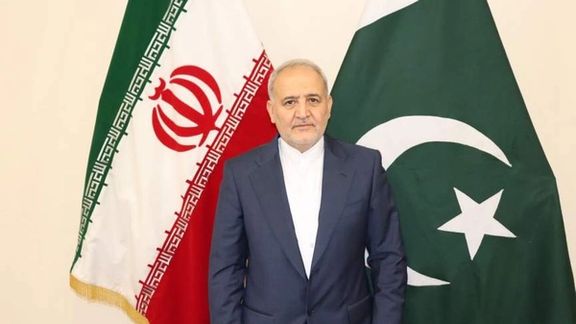
Iran’s new ambassador to Pakistan has said Iran can help to solve Pakistan's energy crisis by supplying electricity, gas and oil at the "lowest price."

Iran’s new ambassador to Pakistan has said Iran can help to solve Pakistan's energy crisis by supplying electricity, gas and oil at the "lowest price."
Speaking to local media in Islamabad on Saturday, Reza Amiri Moghadam, who was appointed as Iran's new ambassador in June, said that the Islamic Republic would be able to relieve Pakistan's electricity and gas shortages with cheap fuel.
His comments come three weeks after the Iranian Foreign Minister Hossein Amir-Abdollahian visited Pakistan and their Ministry of Energy announced that a new contract had been signed to increase electricity imports from Tehran.
During his unofficial discussions with the media, Moghadam also claimed that the gas pipeline project and Iran's gas purchase from Pakistan wouldn't be threatened by US sanctions.
Iran itself is facing severe energy shortages, but President Ebrahim Raisi’s administration has continued to increase electricity and gas exports mostly to Iraq, Pakistan, and Afghanistan.
In addition to increasing gas exports, various reports indicate that Iran has resorted to extensive mazut combustion in power plants and industries to compensate for domestic gas shortages. Mazut is the most polluting fossil fuel and leads to severe air pollution.
Earlier this year, Tehran warned Islamabad that if it fails to complete its share of the gas pipeline project by March 2024, it would have to pay around $18 billion in fines. Washington opposes the construction of this pipeline and considers it a violation of US and Western sanctions against Iran.
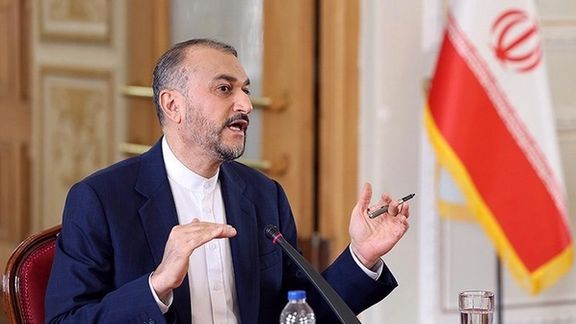
Iran's foreign minister has expressed his gratitude for the mediation efforts of Qatar and Oman in the ongoing process to release Tehran's frozen assets.
Hossein Amir-Abdollahian made separate telephone conversations to his Omani and Qatari counterparts during which he recognized and commended their mediation efforts to facilitate negotiations to unfreeze Iran's assets.
These discussions also underline the multifaceted nature of Iran's diplomatic engagement, encompassing broader bilateral economic, political, and regional matters.
Earlier this month, Iran and the United States announced that $6 billion frozen in South Korea due to US sanctions will be released through Qatari mediation, as Iran releases five US hostages from prison into home detention.
The Iranians insist that the release of the US citizens was part of a prisoner exchange agreement not related to the release of the funds. However, it is clear that the hostages are being kept in Tehran until the money reaches Iranian bank accounts in Qatar.
Currently, the funds are with the central bank of Switzerland, which is exchanging them into Euros gradually and will transfer to Qatar where Iran will be able to access them.
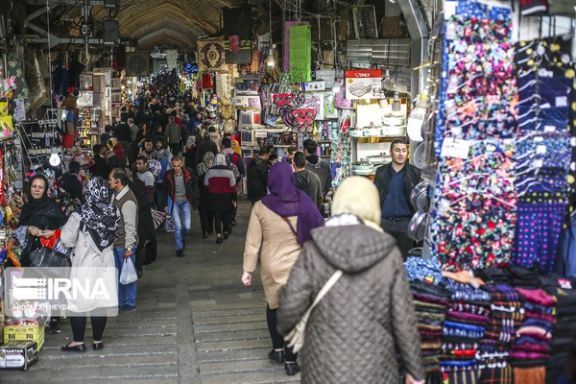
Iran’s economy is facing significant medium-term internal and external risks, the World Bank’s Iran Economic Monitor (IEM) said in its latest report this month.
While domestically, “there is a risk of escalating social tensions and strikes in manufacturing,” externally, Iran faces “the possibility of an even weaker global demand for oil, a sharper decline in oil prices, and the intensification of US sanctions.”
The chances for more US sanctions, however, are low, as the Biden administration this month agreed to release around $9 billion of Iran’s frozen funds in Iraq and South Korea in a hostage release deal. The administration has not announced any new sanctions in the past 80 days, despite no change in Tehran’s foreign policy and regional behavior.
The IEM report says that less sanctions enforcement is one of the factors that can lower the mid-term risks to Iran’s economy, coupled with higher oil prices and more trade with China, which is its main oil customer.
“On the upside, a partial waiver of sanctions, or stronger ties with neighboring countries and China, could provide a boost to oil and non-oil growth,” the World Bank group said.
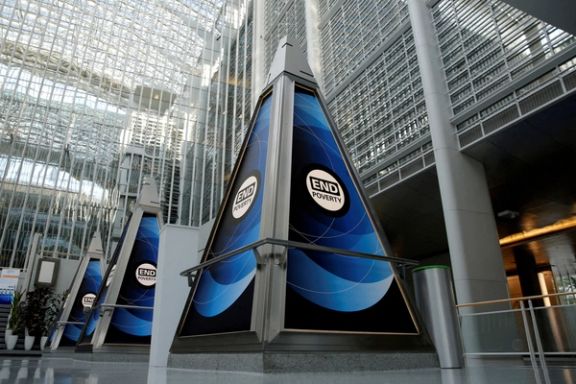
This assessment by the IEM was reflected in what the head of Iran’s Budget and Planning Organization, Davoud Manzour, stated on Sunday. “The difficult conditions imposed by sanctions as an external factor have cast a shadow over Iran’s economy,” he conceded.
“Ongoing economic sanctions, slowing global demand, and energy shortages drive the economic outlook. GDP growth is projected to remain modest in the medium term, with both oil and non-oil GDP underperforming due to ongoing sanctions and years of underinvestment,” the World Bank study pinpointed.
Although international organizations collect most of their data on Iran from government sources, which are often contradictory and less than reliable, but the IEM report overall did capture the serious weaknesses in the country’s governing and economic management systems.
Iran must undertake significant reforms to deal with multiple crises it faces, the IEM argued. “To ensure a sustainable growth rate in the face of multiple crises, significant reforms are necessary, including those on the fiscal side and the banking sector,” the report covering the spring and summer period concluded.
The report emphasized that the Islamic Republic needs structural fiscal reforms to balance expenditures with government revenues, specially amid continuing sanctions that directly impact the oil-dependent economy.
While the centralized and mostly government-controlled economy has muddled through with oil-export revenues for four decades, but structural issues have added up and made matters worse when in the past decade oil sanctions have reduced the government’s leeway to stay afloat.
The report, addressing these structural issues also mentioned the fragile banking system, mostly controlled by the government. “The banking system faces multiple and longstanding challenges including negative capital adequacy ratio and high non-performing loans.”
Iran International reported August 22, that Iran’s central bank has decided to dissolve several non-liable banks and savings and loan institutions. These institutions present an extra risk for a government that already relies on printing money to pay its bills. But dissolving a few banks or merging them with others does not solve the structural problems in the banking system, including political interference and opaque operations.
“Addressing these challenges requires enhanced bank supervision, the implementation of international regulations and best practices for asset classification, liquidity management, and internal controls,” the IEM added.
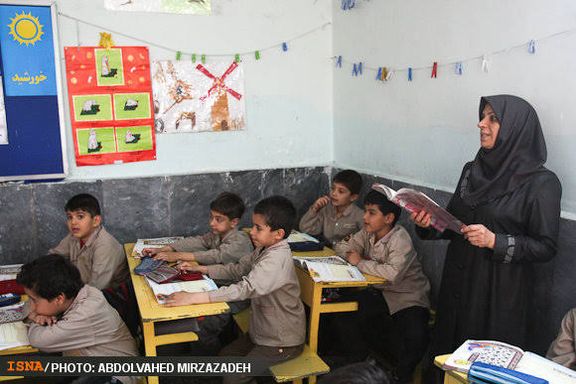
Iran's Teachers' Association says that a third of the country's educators earn less than $200 a month and has brought attention to their financial challenges.
The Association revealed that 32% of teachers in Iran earn less than $200 in monthly salary, contradicting minister Education Minister Reza Morad Sahraie's claim that no teacher receives a salary below this amount.
Citing salary slips from a comprehensive sample of three thousand teachers, the Teachers' Association highlighted the significant number of educators struggling with inadequate compensation. The data indicates that nearly one-third of teachers across the nation receive less than 100 million rials, which is equivalent to approximately $200.
Furthermore, the survey shed light on the broader spectrum of teacher salaries. A substantial 81% of educators reported earnings ranging from $110 to $300.
In response to the Minister's claims, the Teachers' Association voiced skepticism, stating, "It is plausible that the Minister's assertions are either untrue or indicative of a lack of control over the domain he oversees."
It is worth noting that Hossein Rasouli, an official from the Workers’ House, recently emphasized that the monthly minimum wage of less than $200 merely covers "nine days of a family's life." Rasouli further elaborated that the minimum monthly wage for workers in Iran falls short of eighty million rials (approximately $150 USD), emphasizing the ongoing economic challenges.
The issue of inadequate salaries is not new to Iran. Real incomes have struggled to keep pace with inflation since the establishment of the Islamic Republic in 1979. Earlier reports from mid-2022 highlighted a staggering 300% increase in rents in Tehran over the span of three years, further underscoring the economic pressures faced by citizens.
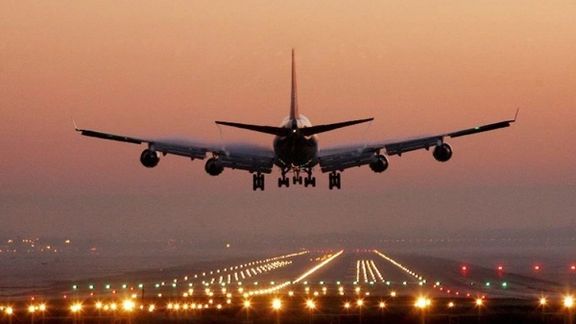
Two Iranian flights from Tehran and Mashhad to neighboring countries made emergency landings due to "technical issues," local media reports.
Tasnim News Agency reported that an Airbus flight operated by Qeshm Air, scheduled from Tehran to Istanbul on Saturday, was redirected back to the capital's international airport due to technical complications.
The Chief of Public Relations at Qeshm Air affirmed that the affected flight was re-schduled using a "backup aircraft" and assured Tasnim that "all passengers are safe and sound."
Tasnim, which is affiliated to the Revolutionary Guards, also disclosed that a Sepehran Airlines flight from Mashhad to Najaf, Iraq executed an emergency landing at the Hashemi Nejad Airport on Saturday.
Decades-long sanctions have inhibited Iran's ability to procure passenger aircraft and related equipment from international markets, leading to an aging national aviation fleet. Mohammad Mohammadi-Bakhsh, the Head of the Iranian Civil Aviation Organization, earlier revealed that among Iran's 330 registered planes, 139 are currently grounded. Some of these aircraft have been deemed unsuitable for return to service, raising concerns about accurately assessing the magnitude of the aviation crisis facing the country.
Iran's civilian airlines have grappled with shortages since the 1990s, often resorting to leasing older planes or acquiring spare parts through intermediaries. Over time, the technical condition of their fleet has deteriorated, culminating in the present situation that has now reached a critical juncture.

SpaceX Falcon 9 rocket was launched to the ISS with a diverse crew of four astronauts, including Iranian-American Commander Yasmin Moghbeli.
The launch marks the initiation of the Crew-7 mission, anticipated to extend beyond six months.
The multinational crew, hailing from distinct space agencies across the globe, was seated aboard the SpaceX Crew Dragon Endurance capsule.
The capsule gracefully soared atop the Falcon 9 rocket from NASA's Kennedy Space Center in Florida on Saturday.
Comprising the mission team are NASA's Jasmin Moghbeli, who assumes the role of mission commander; Danish astronaut Andreas Mogensen, representing the European Space Agency; Satoshi Furukawa from the Japan Aerospace Exploration Agency (JAXA); and Russian cosmonaut Konstantin Borisov of Roscosmos.
Following a successful launch, Commander Jasmin Moghbeli communicated her admiration for the team's performance, addressing SpaceX mission control from within the Crew Dragon capsule. "Space travel is difficult, but you make it look easy," she conveyed, acknowledging the collaborative spirit of the crew. "We're a united team with a common mission," she continued. "Go Crew-7. Awesome ride."
Celebrating the diversity inherent in the Crew-7 team, Commander Moghbeli highlighted the symbolic significance of their diverse nationalities. "We are extremely proud — and I know I personally am humbled — to be a member of this incredible crew, where if you look at our four patches you’ll see a different nation’s flag on each one," she emphasized.
Other projects involve analyzing the variations in sleeping patterns in microgravity, investigating the formation of biofilms in wastewater for enhanced water recycling methods, and contributing to the ongoing understanding of living and working in the unique environment of space.






